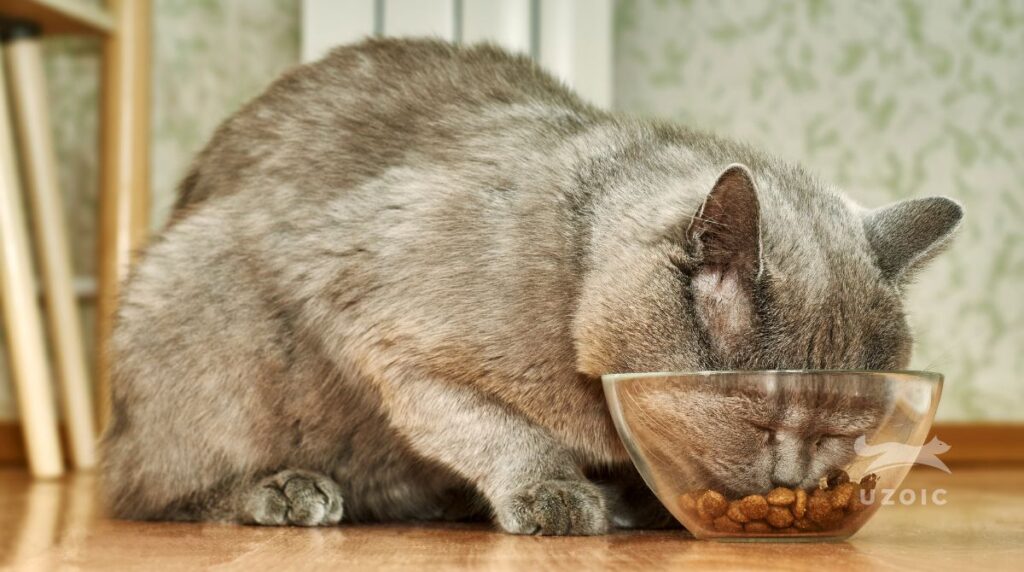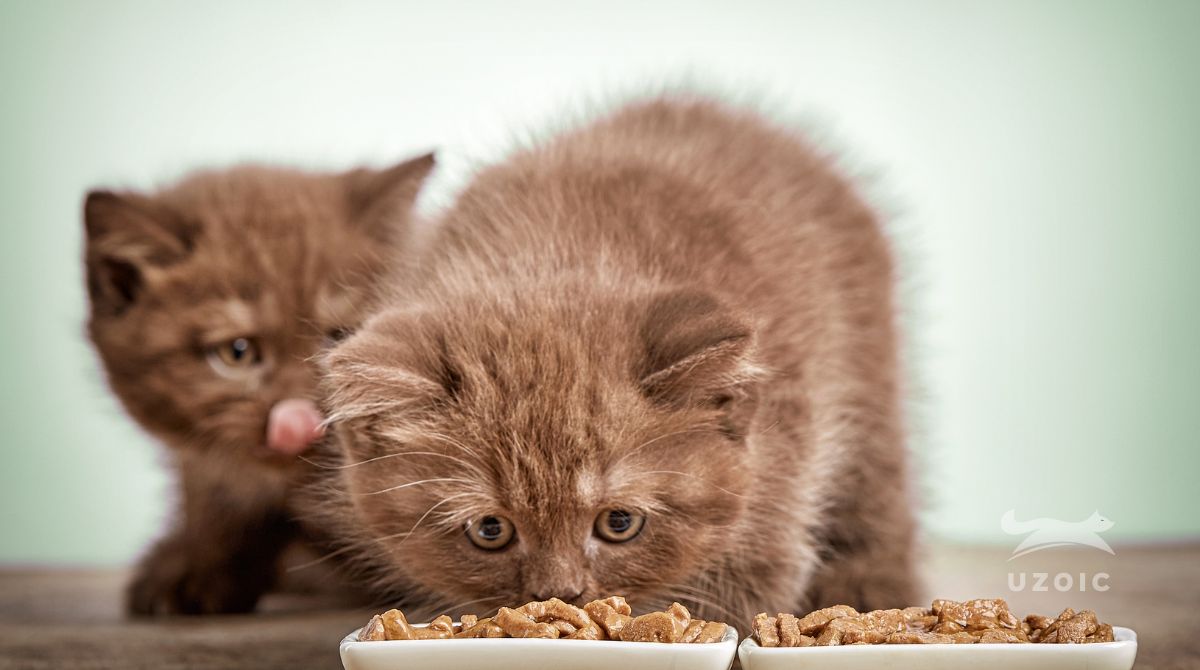If your cat is leaving food crumbs around their dish, it could signify that something is wrong. Today we will explore the possible reasons why your cat might be doing this and how you can help them stop.
Table of Contents
Why do cats leave food crumbs?
When it comes to mealtimes, cats can be notoriously picky eaters. They may nibble at their food for a while, leaving behind a trail of crumbs or polish off their entire meal in seconds. So why do cats leave food crumbs behind?
There are a few possible explanations. First, cats are fussy eaters, and they often leave behind a few crumbs when they’re done with their meal.
While it may seem like they’re just messy eaters, there’s a reason behind this behavior.
Cats are instinctive hunters, and in the wild, they would often eat their prey in small pieces, consuming only what they need and leaving the rest behind.
This behavior has carried over into domestic life, and so when cats see food, their natural impulse is to tear it into small pieces.
However, since most cat owners prefer not to have their homes littered with bits of food, it’s important to provide your cat with feeders.
These feeders are designed to slow down the eating process and encourage your cat to eat their food in smaller, more manageable pieces.
Another possible explanation for why your cat leaves food behind is that they are not getting enough of the nutrients they need from their diet.
If your cat is leaving food in their dish, it’s good to talk to your veterinarian about changing their diet. They may need more protein or a different type of food altogether.
Whatever the case, your vet will be able to recommend a food that is best for your cat’s individual needs.
One reason why your cat may be leaving food crumbs is that the crumbs might be soggy or stale, or your cat is bored with their food.
If they are eating the same thing day in and day out, it’s no wonder they might not be finishing all their food.
Try mixing things up by adding some wet food to their diet or offering them a variety of dry foods.
Finally, some cats prefer to eat small meals throughout the day rather than one large meal. So if your cat leaves food in their dish, try giving them smaller meals more often. This will help them get the nutrition they need without feeling like they’re overeating.
While all these reasons are fair and valid from a dietary perspective, a common reason why cats leave food crumbs is associated with whisker stress.
Whisker Stress

Whisker stress is a condition that affects cats who have sensitive whiskers. When their whiskers touch the sides of their food bowl, it can cause them discomfort or even pain.
Whisker stress is one of the top reasons why your cat is leaving food crumbs all around the dish. For some cats, this can be uncomfortable or even painful. As a result, they may try to avoid contact with the bowl by leaving food behind.
If you think your cat might be experiencing whisker stress, you can do a few things to help. First, try switching to shallow food bowls for cats.
Shallow bowls will allow your cat’s whiskers to lay flat in the dish and hopefully reduce discomfort.
You can also try wetting your cat’s dry food before serving it. This will make the pellets expand and hopefully not touch your cat’s whiskers.
Why don’t cats ever eat all of their food?
Cats are notoriously finicky eaters, and it’s not uncommon for them to leave behind a significant portion of their food.
While there are several possible explanations for this behavior, one of the most likely is that cats don’t have the same appetite as other animals.
For example, dogs will typically eat everything in their bowl, regardless of how much they need.
In contrast, cats tend to eat only when hungry, stopping as soon as they’re satiated.
Further, cats are natural predators and hunt for their food frequently throughout the day.
In the wild, they would never eat all their food in one sitting because they would never know when their next meal would be.
This instinct has carried over into domesticated cats and is one of the reasons why they often leave food behind.
Another reason can be that it is looking out for fresh food! If a cat’s dish has been sitting out for too long, the cat may not want to eat it because it is no longer fresh.
When I’m in the kitchen, my cat demands food almost immediately. If he finds leftover pieces of something that hasn’t been eaten yet, then it’s fair game for him-and if not? You know what I mean.
As soon as I start with fresh food, he comes running even if leftovers are present in his bowl.
Are Cats finicky when it comes to eating?
Yes, some cats can be very finicky with their food. Cats may be put off by certain foods that don’t appeal to their senses. For example, if its food is too dry or bland, a cat may decide to leave it behind.
They might not like the texture or flavor of their food, which can lead to them leaving behind food crumbs.
If your cat is being picky, try offering them a variety of different foods and textures to see if they will find something they like.
My friend’s cat would shake its head when eating, and all the crumbs would fall all over the floor.
Sometimes the cat goes picking all the crumbs one by one, and other times it behaves as if the crumbs don’t exist.
Cats may sometime ask for more food even though there is food in the bowl. It is just in their nature. They know what they like and dislike.
Cats leave food crumbs because they are messy eaters.
Cats are such messy eaters! They never seem to eat their food neatly and leave a mess behind.
Sometimes it feels like they’re doing it on purpose to annoy us! But there are a few reasons why cats tend to be messy eaters.
For one thing, their whiskers are sensitive, and they need to be able to feel their food to eat it properly. This means that they often drop bits of food on the ground.
In addition, cats typically eat multiple small meals throughout the day, making it difficult to keep their eating area clean.
Finally, many cats prefer to eat vertically, which makes it more likely that they’ll knock over their bowl or spill their food.
Anyone who has ever owned a cat knows that they can be messy eaters. They often spill their food, knock over their water bowl, and leave crumbs everywhere.
Some people think that this is simply because cats are clumsy. However, there is a reason for their messiness. Cats are natural hunters, and in the wild, they typically eat their prey whole.
As a result, they have not evolved to be tidy eaters. Their mouths are designed for tearing flesh, not for delicate tasks like picking up small pieces of kibble.
And since they usually eat on the go, they have no need to be tidy. So if you’re tired of cleaning up after your kitty’s meals, don’t blame them – it’s just their nature.
Also read:
- My Cat Hissed At Me For The First Time: What Does It Mean?
- Why Does My Cat Hate Everyone Except Me?
- What Are Those Squiggly Lines in My Cat’s Eyes? A Guide to Eye Health for Cats
- Flea Collar for Cats: Does It Make Them Lethargic?
Cat food quality issues
When it comes to cat food, quality is key.
If your cat is leaving behind a lot of food crumbs, it might be time to switch to higher-quality food.
Cheap cat foods often contain fillers and artificial ingredients that can make them less appetizing for your cat.
Splurging on a higher quality cat food might help entice your cat to eat all their food and leave fewer crumbs behind.
How to stop my cat from leaving food crumbs?
No matter what the reason is for your cat leaving food crumbs, there are a few things you can do to help.
Try switching to a shallower dish, wetting their food, or offering them various foods.
If all else fails, you might need to change to higher-quality cat food.
I highly recommend a cat food tray that can catch all the crumbs so that it does not mess up your floor and keeps ants away.
Final Thoughts
Don’t worry too much if your cat is leaving food crumbs around their dish. It is a perfectly safe habit with a few possible reasons, as outlined above.
I recommend that you start by addressing whisker stress and serving food in a shallow bowl to see if it makes a difference. It is always good to have a tray below the serving bowl to catch all the crumbs.
However, if you’re concerned about your cat’s eating habits, it’s always best to consult with your veterinarian.
They can help you figure out if there’s a more serious issue at play and provide guidance on how to best care for your cat. Thanks for reading!


